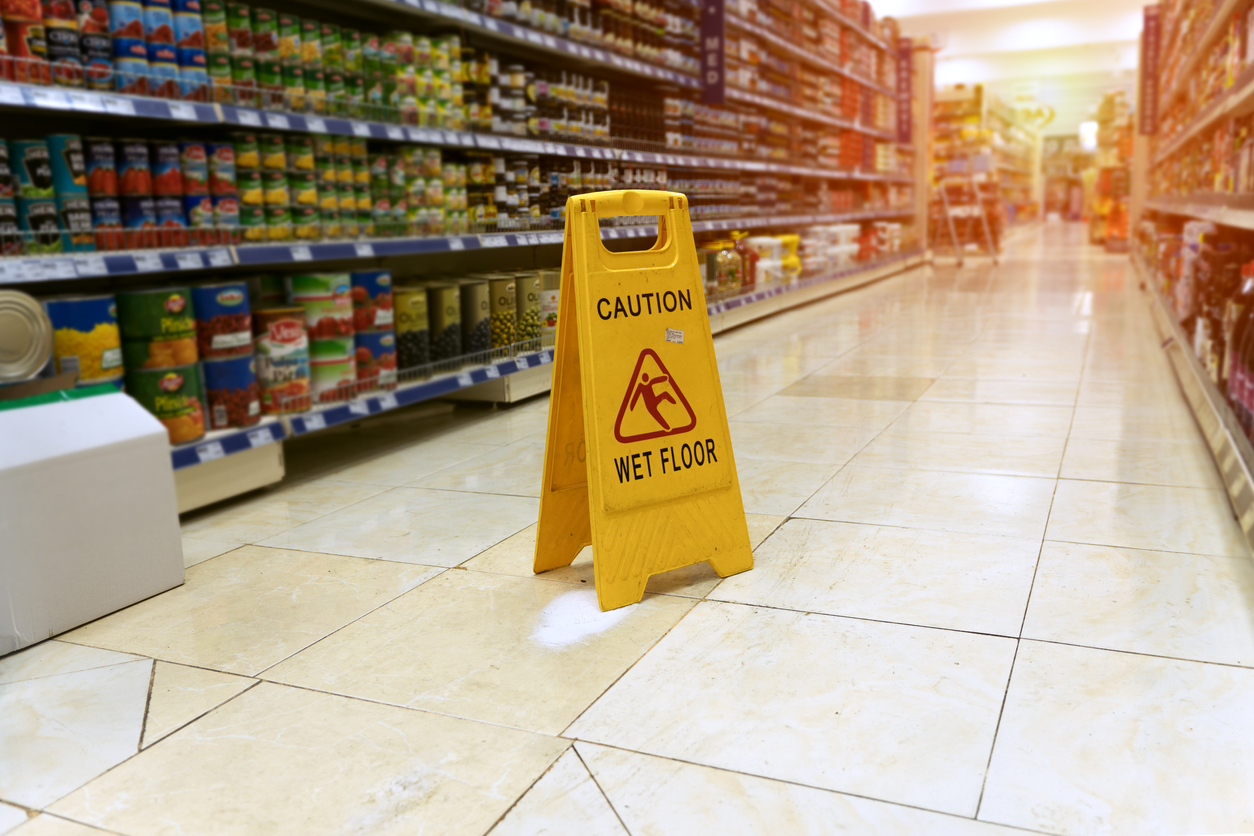Who’s Responsible if I Fall at a Store in Florida?
Bill Allen | August 27, 2025 | Premises Liability

Slip and fall accidents in Florida stores are more common than many realize. A sudden fall can leave you with serious injuries, medical bills, and lost wages. If you are hurt in a store, you may wonder: Who is legally responsible for my accident? Under Florida law, determining liability depends on several factors. Here is what you need to know about the basics of a slip and fall case.
Common Hazards Leading to Falls in Florida Stores
Many store-related falls are preventable.
Some of the most common causes of slips and falls include:
- Spilled liquids or food: Grocery stores, restaurants, and convenience stores often face hazards from spilled products that create slippery floors.
- Uneven flooring or loose mats: Cracked tiles, torn carpets, or misplaced mats can trip customers.
- Cluttered aisles: Merchandise or debris left in walkways increases the risk of tripping.
- Poor lighting: Dimly lit stairways, parking lots, or hallways can hide hazards.
- Broken handrails or steps: Unsafe staircases create obvious risks for falls.
Each of these situations may give rise to a negligence claim if the store failed to take reasonable steps to fix the hazard or warn customers.
When Is a Store Liable Under Florida Law?
Florida law requires businesses to maintain their premises in a reasonably safe condition for customers. This duty includes inspecting the property, warning about hidden dangers, and correcting hazardous conditions promptly.
A store can be held financially responsible for accidents that occur when it fails to do so. Florida law requires a personal injury victim to prove the business had actual or constructive knowledge about a hazard and failed to act in cases involving a “transitory foreign substance,” such as liquid spills or loose items.
How Do I Prove Liability if I Fall at a Store in Florida?
You will need to establish certain elements to hold a Florida store responsible for your injuries.
These include:
- Duty of care: You must show that the store owed you, as a lawful customer, a duty to keep the premises safe.
- Breach of duty: You must show the store failed to address a dangerous condition or provide a warning.
- Notice: You must show the store knew or should have known about the hazard.
- Causation: You must show that the unsafe condition directly caused your fall and injuries.
- Damages: You must show that you suffered actual losses, such as medical expenses, lost wages, or pain and suffering.
Proving that the store had notice of the hazard is often the most contested issue. For example, if a drink spilled seconds before your fall, the store may argue that they did not have a reasonable opportunity to clean it up.
When Might a Store Not Be Liable for My Fall?
Not every fall in a Florida store results in legal liability. There are some situations where the store may not be responsible for a fall.
These include situations involving:
- Open and obvious dangers: A store may not be liable if the hazard was visible and you ignored it.
- Comparative negligence: Florida follows a modified comparative negligence rule. This means if you are found more than 51 percent responsible for your fall, such as due to running or walking while distracted, you cannot recover damages.
- Unauthorized entry: Trespassers have limited legal protections compared to paying customers or guests. A store is typically not liable for harm caused to a trespasser.
These defenses highlight the importance of gathering strong evidence after a fall. If you or a loved one has been injured, you bear the burden of proof for your claim.
Who Else Might Be Responsible for My Fall?
Store owners and operators are often the first parties considered in a slip-and-fall case, but other individuals or companies may also share responsibility. Liability may extend to third parties whose negligence contributed to the dangerous condition.
These include:
- Property owners or landlords: A landlord or property management company may be liable if the store is a tenant and unsafe conditions, like defective flooring, leaky roofs, or broken stairways, caused the fall.
- Maintenance and cleaning contractors: Janitorial or maintenance companies hired to clean floors or repair hazards can be held accountable if their negligence created an unsafe condition.
- Product manufacturers or installers: A manufacturer or installer may be responsible under product liability law if a defective escalator, handrail, shelving unit, or flooring material caused the fall.
Because multiple parties may be involved, a thorough investigation is critical in these cases.
Contact the Florida Premises Liability Lawyers at Allen Law Accident & Injury Lawyers for Help Today
If you fall in a store in Florida, the store may be held responsible if your accident was caused by a dangerous condition that the business knew or should have known about. However, proving liability requires strong evidence and careful analysis.
Consulting with a Florida premises liability lawyer at Allen Law Accident & Injury Lawyers can help you better understand your options and pursue compensation. Contact us today for a free consultation.
We have three convenient locations in Marion County and Alachua County, North Central Florida:
Allen Law Accident & Injury Lawyers – Gainesville Office
2550 SW 76th St #150
Gainesville, FL 32608
(877) 255-3652
Allen Law Accident & Injury Lawyers – Downtown Gainesville
621 W University Ave
Gainesville, FL 32601
(866) 928-6292
Allen Law Accident & Injury Lawyers – Ocala Office
112 S Pine Ave
Ocala, FL 34471
(352) 351-3258

